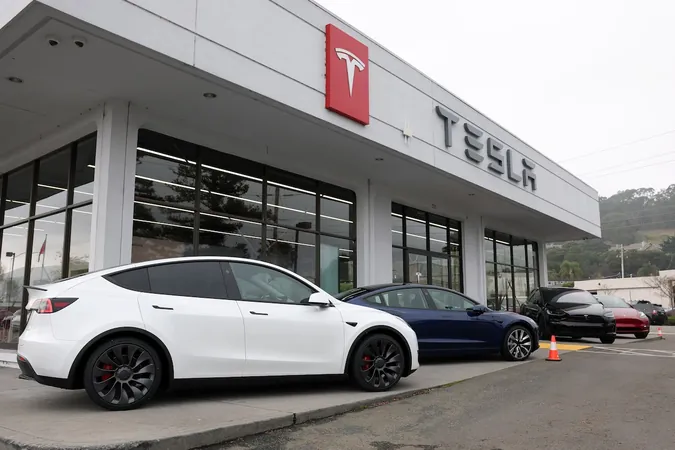
Canadian EV Buyers Turn Away from Tesla as Elon Musk's Controversial Politics Emerge
2025-01-03
Author: Michael
In 2019, Jeff Cowie was thrilled to join the electric vehicle (EV) movement after purchasing a Tesla Model 3. As an environmentally conscious individual and avid Apple user, the Tesla's fusion of fun and tech aligned perfectly with his ideals. However, in a shocking turn of events, his enthusiasm has soured. After logging just 33,000 kilometers, Cowie's car developed concerning suspension issues, making him feel like he was driving a clunker. When faced with a hefty $5,000 repair bill, he opted to sell the vehicle—leaving the Tesla brand behind for a Hyundai Ioniq 5. "As Elon exposed himself for who he truly was, I wanted to get as far away from him as possible," Cowie stated.
This shift in sentiment stems not only from technical difficulties but also from Elon Musk's controversial political pivot. The billionaire CEO has made headlines with his support for Donald Trump and his polarizing conspiracy theories, which have alienated a once-loyal customer base. "He sold me a false bill of goods all around," Cowie lamented. His thoughts echo a growing wave of discontent among Tesla owners who once celebrated their vehicles as symbols of green technology.
Marketing expert Jake Brower noted that many potential Tesla buyers now refuse to purchase a vehicle associated with Musk. When Brower and his wife considered buying their first EV last summer, her first words were, “We’re not looking at a Tesla. I don’t want a penny of my money going to anything Musk is involved in.” The couple ultimately decided on a Ford Mustang Mach-E, benefiting from significant manufacturer and government incentives totaling around $20,000.
Tesla's troubles are not strictly anecdotal; they are reflected in disturbing trends. For the first time in over a decade, the company reported a drop in annual vehicle sales in early 2024. In California, a historical stronghold for Tesla, new registrations fell by 3.5% in the third quarter. Despite the Tesla Model Y retaining its title as the best-selling car in the state, growing concerns about Musk’s politics have left a mark. Actor Jason Bateman even confessed he sold his Tesla due to his discomfort with Musk’s ideologies, comparing it to driving around with a Trump sticker attached to his vehicle.
Moreover, there is a noticeable decline in EV rebates for Tesla in Canada. The rebate numbers are telling; they plummeted from around 19,980 in late 2023 to about 9,300 in the last quarter. Tesla’s share of Canadian EV rebates fell from 47.5% to under 25% in just one year, indicating a substantial decline in consumer interest.
Market analysts suggest multiple factors for this downturn, including an absence of new Tesla models that appeal to buyers. While the highly anticipated Cybertruck has recently been spotted, its starting price of $137,900 makes it far from accessible for the average consumer. Concurrently, competitive automakers have flooded the market with new and affordable EV options, often offering attractive incentives to entice buyers.
Tesla’s Canadian supply may also face challenges due to new tariffs on electric vehicle imports from China, where some Tesla models were manufactured. While the effects of these tariffs are still being assessed, experts like Erik Johnson of BMO Capital Markets suggest there may be a significant impact on Tesla’s sales.
Andreas Souvaliotis, a marketing expert, opined that Musk’s fame is now a hindrance for Tesla. He posited that Musk's increasingly unpopular persona means potential buyers might steer clear altogether. "When you wrap one brand around another and the core item, the leader, becomes unpopular, recovery becomes difficult," he pointed out.
Some academics believe Musk's shift could wind up being a double-edged sword. David Soberman of the University of Toronto indicated that divided politics might create new consumer bases, allowing Tesla to attract more right-leaning individuals despite losing left-leaning buyers.
Surveys, however, paint a more cautious picture. A recent poll from YouGov revealed that the number of Canadians willing to buy a Tesla has dwindled since its peak in 2022. Notably, the company’s reputation has seen slight improvement since the recent U.S. elections, suggesting an ongoing evolution in public sentiment.
Looking to the future, speculation surrounds Tesla's potential launch of a new, affordable model—dubbed the "Model Q"—which could hit the market in 2025. Deutsche Bank analysts believe this release could reignite interest among early adopters, even amidst Musk's controversial popularity.
However, some early fans have also distanced themselves. Baha Ohcebol, a technology entrepreneur, was initially attracted by Tesla's Autopilot technology but felt let down by the car's quality and Musk’s erratic behavior. Inspired primarily by Musk’s tumultuous image, Ohcebol is now attempting to sell his Model S. "That’s not the only reason I’m selling, but it was the trigger. I don’t want to be associated with that guy," he said.
As consumer attitudes continue to shift, it remains to be seen whether Tesla can navigate these choppy waters or whether Musk's political persona will irreparably tarnish the brand's appeal in the electric future.



 Brasil (PT)
Brasil (PT)
 Canada (EN)
Canada (EN)
 Chile (ES)
Chile (ES)
 Česko (CS)
Česko (CS)
 대한민국 (KO)
대한민국 (KO)
 España (ES)
España (ES)
 France (FR)
France (FR)
 Hong Kong (EN)
Hong Kong (EN)
 Italia (IT)
Italia (IT)
 日本 (JA)
日本 (JA)
 Magyarország (HU)
Magyarország (HU)
 Norge (NO)
Norge (NO)
 Polska (PL)
Polska (PL)
 Schweiz (DE)
Schweiz (DE)
 Singapore (EN)
Singapore (EN)
 Sverige (SV)
Sverige (SV)
 Suomi (FI)
Suomi (FI)
 Türkiye (TR)
Türkiye (TR)
 الإمارات العربية المتحدة (AR)
الإمارات العربية المتحدة (AR)